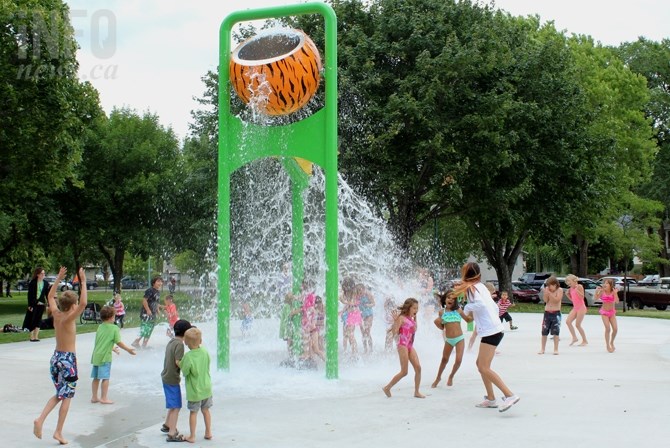
The spray park in McDonald Park in Kamloops is seen in this undated file photo.
Image Credit: FILE PHOTO
June 25, 2021 - 7:30 AM
There’s a seven degree celcius difference in weather service predictions of how hot it’s going to get next week as the heat wave peaks in Kamloops and the Okanagan but one thing forecasters agree on is that records are going to fall and the heat is going to linger.
AccuWeather shows the heat peaking at 47 C in the Okanagan on Tuesday with Kamloops hitting 45 C, but that’s far above the 40 C Environment Canada predicts for Kelowna and 41 C for Kamloops.
“There’s no way it’s going to be 47 C in Kelowna,” Environment Canada meteorologist Doug Lundquist told iNFOnews.ca. “But, take Environment Canada’s forecasts and add two degrees every day to that.”
“Some of the model data we’re getting in, is probably a little high for that area,” countered Brett Anderson, senior meteorologist with AccuWeather. “I think, probably, 44 C I like better. Certainly, the 40 C is not high enough. Not even close. Certainly, 44 C is a little better, maybe even 45 C.”
Lundquist certainly sees 45 C as a possibility. He says there’s a chance that the all-time high temperature record for Canada will be broken somewhere in B.C. next week. That was 45 C set in the towns of Midale and Yellowgrass, Sask. on July 5, 1937.
The record high in B.C. of 44.4 C was set in Lytton and Lillooet on July 16 and 17, 1941.
While those records may or may not be broken, daily high records will be shattered all over the province, both meteorologists predicted.
READ MORE: 'Dangerous long duration heatwave' on its way, Environment Canada warns
Starting this weekend, Environment Canada will post the new records on its website here. Scroll down to Weather Alerts and click on Weather Summaries.
There is no compilation of record highs in regional cities so Lundquist scanned data sheets to come up with what are probably the hottest days ever recorded in the region’s largest cities.
For Kamloops, that was 41.7 C on July 27, 1939, and again on July 16, 1941.
Kelowna recorded 41 C on Aug. 4, 1998, Penticton hit 40.6 C on July 17, 1941 while Vernon just made it to 40 C on July 21, 1908.
Most records are set in July because the sun is up for longer periods each day than in August.
While the sun shines even longer in June, that month is usually cooler and wetter, preventing the kind of heat wave being experienced now.
There are a number of reasons for this happening now, according to both Lundquist and Anderson.
Unusually warm water in the Pacific Ocean has triggered the high pressure ridge forming over the province. That’s diverting the moderating effects of the Jet Stream and pushing that up towards Alaska.
Even when the high pressure ridge starts to weaken later next week, it's not going to move anywhere.
Another factor is the record dry spring in the province, meaning there is less moisture in the ground to evaporate and cool the air.
“It’s not just one thing,” Lundquist said. “They’ve all aligned right at the time of year that the sun has the most power.”
While weather predictions become less accurate the longer out they are made, there is agreement that the hottest temperatures will hit next week and ease only slowly through into at least the second week of July. But, it will still be unseasonably warm with daytime highs in the region over 30 C.
“This is killing type weather,” Lundquist said. “The thing that really concerns me is, you need to protect human health. The health of animals. The health of forests, so you don’t want to start fires. It will ruin our summer. Don’t leave an animal or a plant or a person in a car for even a minute.”
Overnight lows will be 20 C or more next week, meaning people without air conditioning likely won’t see their homes cool below 30 C, he said.
Jumping in a lake or river may help, but also requires caution, Lundquist warned.
“You might think, oh, I’ll go and swim and cool off,” he said. “The water is really cold. People die because they don’t realize how cold the water is and get hypothermia and can’t make it.”
To contact a reporter for this story, email Rob Munro or call 250-808-0143 or email the editor. You can also submit photos, videos or news tips to the newsroom and be entered to win a monthly prize draw.
We welcome your comments and opinions on our stories but play nice. We won't censor or delete comments unless they contain off-topic statements or links, unnecessary vulgarity, false facts, spam or obviously fake profiles. If you have any concerns about what you see in comments, email the editor in the link above.
News from © iNFOnews, 2021